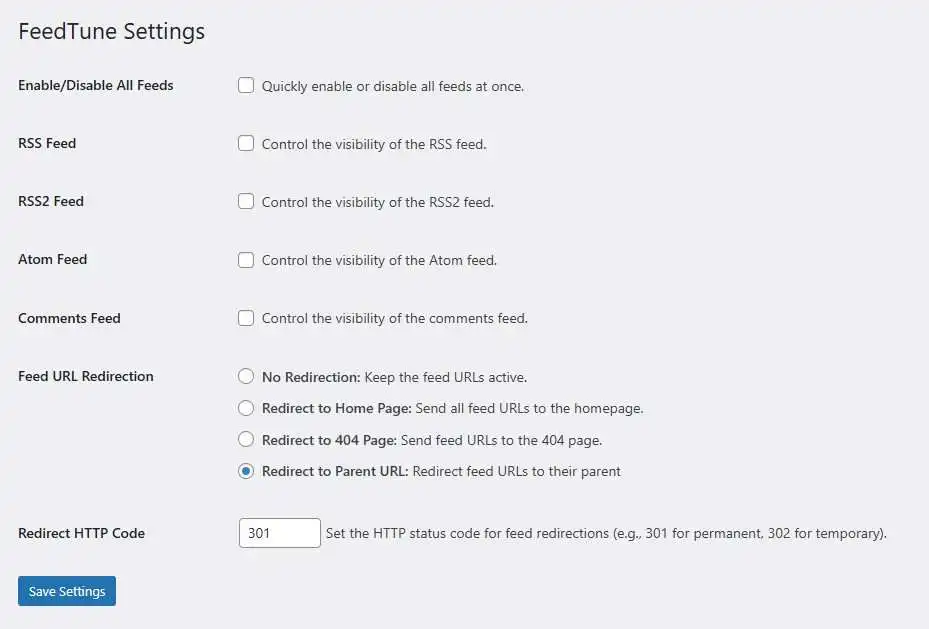As an SEO professional managing multiple WordPress websites, I’ve faced my fair share of challenges. But there’s one recurring problem that frustrated me for years: feed URLs clogging up the “Crawled but not Indexed” section in Google Search Console.
At first, I didn’t even realize the scale of the issue. Each new blog post, tag, or category generated multiple feed URLs.
Google would crawl these feeds but often ignore them for indexing, leaving me with an inflated “Crawled but not Indexed” count that made it hard to focus on the pages that mattered. And the worst part? The problem grew exponentially as I published more content.
I knew I had to take control of my feeds if I wanted to fix this issue. That’s when I decided to create FeedTune, a plugin that solved this problem once and for all.
The Problem I Faced as an SEO
Let me break it down. WordPress automatically generates feeds for:
- RSS
- RSS2
- Atom
- Comments
- Tags
- Categories
These feeds can be useful, but in most cases, they don’t serve any real purpose for SEO. Instead, they end up cluttering Google Search Console and wasting valuable crawl budget.
Here’s why this was a big problem for me:
- Crawled but Not Indexed:
Feed URLs would dominate my “Crawled but not Indexed” section, making it harder to track and improve the indexing of actual content. - Exponential Growth:
Every time I published a new blog, WordPress created multiple feed URLs. Over time, this led to thousands of unnecessary URLs in my crawl reports. - Wasted Crawl Budget:
Google only has so much time and resources to crawl your site. Feed URLs were consuming this crawl budget instead of allowing Google to focus on my important pages.
I tried using existing plugins to fix the problem, but none of them offered the precise control I needed. So, I built FeedTune to handle this issue my way.
How FeedTune Solved My Problem
When I designed FeedTune, my goal was simple: to give SEO professionals like myself full control over WordPress feeds. Here’s what makes it so effective:
- Disable Unnecessary Feeds:
With FeedTune, I could disable feeds like Comments or Tags with just a click. This immediately reduced the number of redundant URLs on my site. - Redirect Disabled Feeds:
Instead of letting feed URLs hang in limbo, I used FeedTune to redirect them to meaningful destinations:- Parent Pages: Category feeds redirected to their respective categories.
- Homepage: Tag feeds redirected to the homepage.
- 404 Page: For feeds I didn’t need at all, I redirected them to a proper 404 page.
- Custom HTTP Redirect Codes:
FeedTune allowed me to set SEO-friendly redirect codes like 301 for permanent redirections or 302 for temporary ones. This ensured Google understood exactly what I wanted. - Global Toggle for Feeds:
Managing feeds became super easy with a global toggle to enable or disable all feeds at once. No more fiddling with individual settings unless I wanted to. - Lightweight and Fast:
FeedTune didn’t slow down my site or conflict with other plugins like Rank Math or Yoast SEO. It worked quietly in the background, doing its job without adding bloat.
Why FeedTune Is a Must-Have for SEO Experts
If you’re managing SEO for a WordPress website, you’ve probably faced the same problem I did. Feed URLs might seem like a minor issue, but over time, they can clutter your crawl reports, waste crawl budget, and make it harder to optimize your site.
FeedTune solves this by giving you:
- Complete Control: Disable feeds you don’t need and redirect them to relevant destinations.
- Cleaner Reports: Reduce clutter in Google Search Console and focus on what matters.
- Better Performance: Improve your site speed and SEO by eliminating redundant feeds.
Final Thoughts
Creating FeedTune has been a game-changer for my work as an SEO professional. It’s saved me countless hours of frustration, cleaned up my crawl reports, and ensured my websites perform at their best.
If you’re tired of fighting with WordPress feeds and want an easy way to manage them, I highly recommend giving FeedTune a try. It’s lightweight, effective, and built specifically to solve a problem many of us face.

